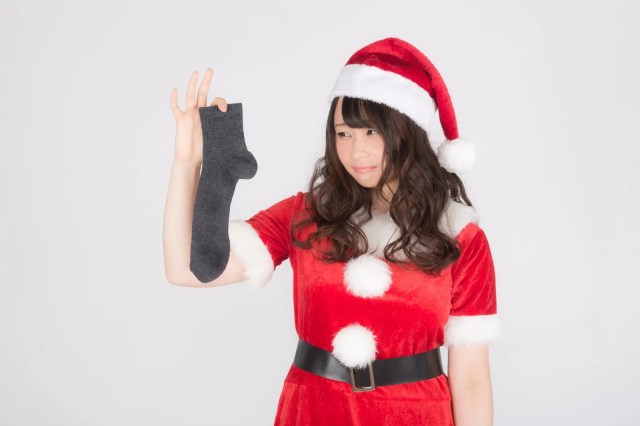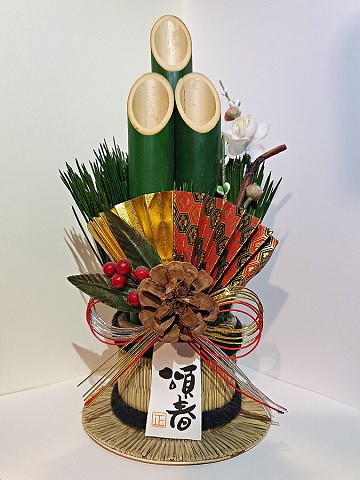
Christmas. Depending on who you are, it can be a time for getting together with family and friends, attending religious services, or maybe just drinking a lot of egg nog. But while all of those are activities of profound cultural and spiritual importance, not everyone has a song in their heart at this time of year.
For a certain set of Japanese women in international marriages and living overseas, ‘tis the season for venting about how Americans and Europeans spend Christmas, and here’s their list of grievances.
The collection of complaints comes by way of blogging internationalist, and overseas Japanese wife herself, Madame Riri. In contrast to the myriad delights of the “12 Days of Christmas” (with the exception of those weird leaping lords), Madame Riri identified six problem areas while sifting through online comments from Japanese expats.
1. Christmas dinner issues
Japan tends to eat smaller portions than the west to begin with, and that difference gets multiplied when it comes to celebrations. “I don’t like meat very much,” begins one woman, “but my American husband, his British mom, and his American dad all love it. But I can’t tell them ‘I don’t want any turkey,’ so I force myself to eat it.”
▼ Honestly, this woman would probably have a similar problem in Japan, where the traditional Christmas dinner is the even heavier fried chicken.
Even some more carnivorous women find the holiday menu doesn’t suit their tastes. “It’s like, ‘Are you kidding me?’” exclaimed one exasperated woman. “The amount of cream, cheese, and sauce in the recipes! I love Asian cooking, so it’s exhausting for me to make them.”
Speaking as a guy who thinks the two best places for cheese are on top of a pizza and absolutely nowhere else, I can sympathize. Still, it’s just one meal a year, and if she’s really that loath to give up the foods she loves, why not incorporate them into the meal, like many American families do with dishes from their ethnic backgrounds?
▼ It’s not Christmas at the Baseels without a bowl of Lebanese hushwe!
2. Choosing presents is a pain
Many women have a bone to pick with picking out presents. In Japan, young couples typically exchange Christmas gifts, and Santa usually brings something to the homes of small children. Extended family members generally don’t give each other anything for the holiday, though.
Instead, relatives often send mid-year (ochugen) and end of the year (oseibo) gifts to each other. These are often practical things, though, like detergent or rice.
▼ Or, most useful of all, beer
So it can be kind of a high hurdle for Japanese wives to suddenly have to think about what to get for each and every one of their spouse’s aunts, uncles, and cousins, especially since in some countries consumables aren’t quite as accepted as proper presents as they are in Japan.
▼ But trust us, your husband’s uncle would love to find this under the tree.
3. Pushy present requests
Sometimes, though, the problem is knowing all too well what someone wants. “My brother-in-law’s ex-wife used to send emails with a list of options to choose from for gifts for her and their kids,” remembered one woman. “And she’d always add, ‘Oh, and don’t forget the gift receipt!’”
Umm…I hate to spoil anyone’s cross-cultural epiphany, but that’s not exactly most westerners’ idea of particularly polite behavior either, and plenty of non-Japanese people would be just as irked by it.
As long as the prices are in line with what the family tends to use as its gift-giving budget, though, it doesn’t seem like there’s that much to get worked up about here. Actually, since this is something the brother-in-law’s ex-wife did, there doesn’t seem to be anything worth still getting worked up over at all.
4. Wrapping gifts is a hassle
We’ll start with the head-scratcher here. One woman said, “Because Japanese people have an allergic reaction to wastefulness, no matter how many years I spend overseas, using wrapping paper still doesn’t sit right with me.”
The complaint about the trash generated by wrapping is a valid one, but it’s a little hard to swallow that Japan has an “allergic reaction” to excessive packaging, as anyone who’s torn into a bag of two-dozen cookies each with their own individual plastic wrapper can tell you.
A more legitimate cultural difference is the other complaint Japanese wives had: having to do the wrapping themselves. After all, in Japan, where retailers take customer service very seriously, you can get just about anything wrapped for you by the store clerk. Overseas, though, when they’re buying stuff for everyone in the family and wrapping it themselves, that’s a lot of time spent folding and taping paper, no matter how festive the pattern on it may be. Of course, you can sidestep this whole problem with gift bags.
5. Getting stuck with presents you don’t like
Again, this really isn’t something that’s exclusive to international relationships, as even when both parties are Japanese, some people’s gift-selecting skills are far from world-class. Still, the above-mentioned gift exchanges between extended family members, who might not see each other that often during the rest of the year, can make for an increased chance of miscues. “Every year, my mother-in-law sends me so many clothes, cosmetics, and decorations, but they’re not really my style…I can’t bring myself to throw them out right away, but after they sit around in my closet for two or three years, I toss them.”
6. Exchanging and returning gifts
After all the effort that they put into choosing a present, some women were miffed at the ease with which they could be returned or exchanged, giving special mention to the ubiquitous of gift receipts. “I work part-time at a retailer in Europe,” shared one woman, “and every day we get one or two customers coming in to exchange a Christmas gift they don’t like. It’s usually wives with things they got from their husbands.”
Part of the reason Japan doesn’t have as much of a culture of returning gifts is because, like we talked about above, gifts between people that aren’t especially close are often consumables. Even if the dish soap your relative sent you isn’t your regular brand, you’ll still use up the bottles, right? Ditto for cans of booze.
▼ Among the three kinds of beer, good, bad, and free, the third is by far the tastiest.
It’s also worth noting that Japan tends to be a bit less fragmented than many other countries in terms of pop culture and fashion. Combine some fairly uniform clothing tastes and trends with the fact that a huge portion of the population is of similarly slender build, and you’ve got a much higher chance of picking something the recipient will like, and that will fit, in Japan than elsewhere.
It’s also hard not to feel like complaint #6, gift returns, and complaint #5, getting things you don’t want, kind of cancel each other out. Ditto for numbers two and three, not knowing what to buy and people telling you what they want.
International marriage is all about adapting to each other and mixing your traditions. Picking which side of the two lines above you feel more comfortable on immediately cuts the list of problems down from six to four, with one of those being as simple as putting up with a single dinner you’re not crazy about. When you stop and look at the big picture, that doesn’t seem like enough to outweigh the positives of the holiday season, and besides, after Christmas, these Japanese wives can have their husbands return the favor with a traditional Japanese oshougatsu New Year’s celebration.
▼ Like Christmas, it features decorated trees.
Source: Madame Riri
Top image: Pakutaso
Insert images: RocketNews24, Sapporo Beer, Toys R Us, Wikipedia/Yupik







 Blogger offers her top four tips for Japanese women dating foreign guys
Blogger offers her top four tips for Japanese women dating foreign guys 7 things Japanese people in international marriages wish they’d known before tying the knot
7 things Japanese people in international marriages wish they’d known before tying the knot From Dad’s autograph to a pack of peanuts: People in Japan reveal their worst Christmas presents
From Dad’s autograph to a pack of peanuts: People in Japan reveal their worst Christmas presents 30 common characteristics of people who fall in love with Japan
30 common characteristics of people who fall in love with Japan McDonald’s new Happy Meals offer up cute and practical Sanrio lifestyle goods
McDonald’s new Happy Meals offer up cute and practical Sanrio lifestyle goods Studio Ghibli glasses cases let anime characters keep an eye on your spectacles
Studio Ghibli glasses cases let anime characters keep an eye on your spectacles All-you-can-drink Starbucks and amazing views part of Tokyo’s new 170 meter-high sky lounge
All-you-can-drink Starbucks and amazing views part of Tokyo’s new 170 meter-high sky lounge Beautiful Sailor Moon manhole cover coasters being given out for free by Tokyo tourist center
Beautiful Sailor Moon manhole cover coasters being given out for free by Tokyo tourist center Super Nintendo World expansion gets delayed for several months at Universal Studios Japan
Super Nintendo World expansion gets delayed for several months at Universal Studios Japan Mister Donut ready to make hojicha dreams come true in latest collab with Kyoto tea merchant
Mister Donut ready to make hojicha dreams come true in latest collab with Kyoto tea merchant More foreign tourists than ever before in history visited Japan last month
More foreign tourists than ever before in history visited Japan last month 11 different ways to say “father” in Japanese
11 different ways to say “father” in Japanese Kyoto’s 100 Demons yokai monster parade returns!
Kyoto’s 100 Demons yokai monster parade returns! Japanese netizens outraged over famous YouTube channel’s treatment of hamsters【Videos】
Japanese netizens outraged over famous YouTube channel’s treatment of hamsters【Videos】 Disney princesses get official manga makeovers for Manga Princess Cafe opening in Tokyo
Disney princesses get official manga makeovers for Manga Princess Cafe opening in Tokyo Starbucks reopens at Shibuya Scramble Crossing with new look and design concept
Starbucks reopens at Shibuya Scramble Crossing with new look and design concept Beautiful new Final Fantasy T-shirt collection on the way from Uniqlo【Photos】
Beautiful new Final Fantasy T-shirt collection on the way from Uniqlo【Photos】 Is the new Shinkansen Train Desk ticket worth it?
Is the new Shinkansen Train Desk ticket worth it? Foreign English teachers in Japan pick their favorite Japanese-language phrases【Survey】
Foreign English teachers in Japan pick their favorite Japanese-language phrases【Survey】 Japanese convenience store packs a whole bento into an onigiri rice ball
Japanese convenience store packs a whole bento into an onigiri rice ball We try out “Chan Ramen”, an underground type of ramen popular in the ramen community
We try out “Chan Ramen”, an underground type of ramen popular in the ramen community Studio Ghibli releases Kiki’s Delivery Service chocolate cake pouches in Japan
Studio Ghibli releases Kiki’s Delivery Service chocolate cake pouches in Japan Japan’s bone-breaking and record-breaking roller coaster is permanently shutting down
Japan’s bone-breaking and record-breaking roller coaster is permanently shutting down New definition of “Japanese whiskey” goes into effect to prevent fakes from fooling overseas buyers
New definition of “Japanese whiskey” goes into effect to prevent fakes from fooling overseas buyers Our Japanese reporter visits Costco in the U.S., finds super American and very Japanese things
Our Japanese reporter visits Costco in the U.S., finds super American and very Japanese things Studio Ghibli unveils Mother’s Day gift set that captures the love in My Neighbour Totoro
Studio Ghibli unveils Mother’s Day gift set that captures the love in My Neighbour Totoro Foreign passenger shoves conductor on one of the last full runs for Japan’s Thunderbird train
Foreign passenger shoves conductor on one of the last full runs for Japan’s Thunderbird train Domino’s Japan now sells…pizza ears?
Domino’s Japan now sells…pizza ears? New Japanese KitKat flavour stars Sanrio characters, including Hello Kitty
New Japanese KitKat flavour stars Sanrio characters, including Hello Kitty Kyoto creates new for-tourist buses to address overtourism with higher prices, faster rides
Kyoto creates new for-tourist buses to address overtourism with higher prices, faster rides Sales of Japan’s most convenient train ticket/shopping payment cards suspended indefinitely
Sales of Japan’s most convenient train ticket/shopping payment cards suspended indefinitely Sold-out Studio Ghibli desktop humidifiers are back so Totoro can help you through the dry season
Sold-out Studio Ghibli desktop humidifiers are back so Totoro can help you through the dry season Japanese government to make first change to romanization spelling rules since the 1950s
Japanese government to make first change to romanization spelling rules since the 1950s Ghibli founders Toshio Suzuki and Hayao Miyazaki contribute to Japanese whisky Totoro label design
Ghibli founders Toshio Suzuki and Hayao Miyazaki contribute to Japanese whisky Totoro label design Doraemon found buried at sea as scene from 1993 anime becomes real life【Photos】
Doraemon found buried at sea as scene from 1993 anime becomes real life【Photos】 Tokyo’s most famous Starbucks is closed
Tokyo’s most famous Starbucks is closed One Piece characters’ nationalities revealed, but fans have mixed opinions
One Piece characters’ nationalities revealed, but fans have mixed opinions We asked a Uniqlo employee what four things we should buy and their suggestions didn’t disappoint
We asked a Uniqlo employee what four things we should buy and their suggestions didn’t disappoint Princesses, fruits, and blacksmiths: Study reveals the 30 most unusual family names in Japan
Princesses, fruits, and blacksmiths: Study reveals the 30 most unusual family names in Japan Japanese men rank the top 10 complaints they hope to never hear from their wives
Japanese men rank the top 10 complaints they hope to never hear from their wives Four moments when Japan’s single men are glad they’re not married
Four moments when Japan’s single men are glad they’re not married Five Japanese misconceptions about foreign male/Japanese female couples
Five Japanese misconceptions about foreign male/Japanese female couples Only one demographic in survey is happy about Japan’s workplace obligation Valentine’s chocolate
Only one demographic in survey is happy about Japan’s workplace obligation Valentine’s chocolate Some important Christmas shopping advice for parents of otaku and fujoshi kids
Some important Christmas shopping advice for parents of otaku and fujoshi kids The odd phenomenon of some Japanese husbands making their wives put their socks on for them
The odd phenomenon of some Japanese husbands making their wives put their socks on for them How much do Japanese girls expect their boyfriends to spend on Christmas presents? 【Poll results】
How much do Japanese girls expect their boyfriends to spend on Christmas presents? 【Poll results】 Coca-Cola Japan releases new Christmas bottles with ribbon labels and music
Coca-Cola Japan releases new Christmas bottles with ribbon labels and music 5 powerful reasons to be a woman in Japan 【Women in Japan Series】
5 powerful reasons to be a woman in Japan 【Women in Japan Series】 Japanese fast food chain offers “Lonely Christmas” meal packs for the dateless this December
Japanese fast food chain offers “Lonely Christmas” meal packs for the dateless this December “HOW much?!” Professor estimates appropriate salary for housewives, housewife actresses gasp
“HOW much?!” Professor estimates appropriate salary for housewives, housewife actresses gasp Find a red envelope on the ground? Here’s why you should never pick it up
Find a red envelope on the ground? Here’s why you should never pick it up
Leave a Reply